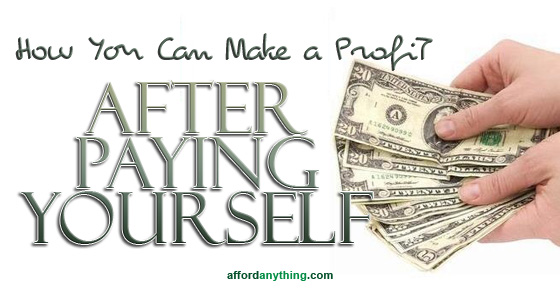The biggest mistake I’ve made as an entrepreneur? Confusing my role as an investor with my role as the general manager.
As an investor, my role is to infuse money into a project or a company. Then I kick back and wait for the returns.
As the general manager, my role is to oversee the daily grind. I send emails, make phone calls, conduct research, source supplies, and do a hundred other tasks that amount to the nuts-and-bolts of the daily drudgery.
In many entrepreneurial ventures, it’s common to wear many hats — to be both the investor and the employee. In doing so, it’s easy to confuse “profit” with “paycheck.”

You Don’t Work For the Stocks You Own
If I bought stock in Coca-Cola, I wouldn’t be expected to renovate the Coke bottling factory, drive to the delive
ry warehouse when an order gets shipped, or design the next Coke commercial. As an investor, that’s not my job. My job is to raise the capital, accept the risk, and collect the return.
If I designed the next Coke commercial or drove to the warehouse to oversee shipping, I’d demand to be paid for my work, regardless of whether or not I also invest in the company.
Why should running your own business be any different?
Recently, I’ve come to realize that within my real estate activities, I’ve been confusing my role as an investor with my job as the project manager. Many real estate investors – including me – think we can make a “bigger return” by doing the work ourselves. That’s means we’re performing hours of tasks, valuing that labor at $0, and then proclaiming, “Hey look, I just made a 10 percent return!”
Newsflash: that’s not “making a return.” That’s taking on a second job (often a poorly-paying one).
Pay Yourself
As a business owner, my role is to say, “I need to hire someone at $X/hr, and their tasks will be …”
If I’m strapped for cash, I’ll hire myself. If I’ve got money to invest, I’ll hire a more-qualified candidate.
But I shouldn’t confuse my paycheck with my profit. Those are distinct payments, made for distinct contributions.
I’ve been making that mistake within my real estate investing projects. My recent decision to start delegating work, rather than doing everything myself, brought that reality to light. When you HAVE to put a monetary value on labor costs, the true profit margins come into sharp focus.
Profit vs. Paycheck
About a year ago, I wrote a blog post called The Biggest Mistake Small Business Owners Make.
In that post, I described how small business owners often confuse “making a profit” with “earning a living.” I illustrate this with a hypothetical scenario about a freelance writer named Sally:
Sally subtracts [her expenses] from her income of $55,000, and reasons that her business made a pre-tax profit of $44,608. Right? Wrong. $44,608 isn’t the profit her business made … it’s simply money left over to pay herself a salary.
Let’s imagine Sally had an assistant who earned $25,000 a year doing research for Sally’s stories. Sally would deduct that research assistant’s pay as an “expense” before calculating her profits, right? So why doesn’t she value her own time?
In other words: I can’t value my time at $0, value someone else’s time at a rate that’s greater than $0, and make an apples-to-apples comparison between the two.
When I wrote that post, one reader left a comment saying:
“… the IRS says that profit after expenses (net profit) *IS* the owner’s income/salary. So in a sense, it is profit – from an IRS standpoint.”
Yep, that’s part of the problem. Our tax code reinforces the idea that your time is worth $0 if you do-it-yourself.
Don’t take business lessons from the IRS.
Your Biz Might Not Be Profitable YET – And That’s Okay
That being said, very few businesses are profitable in their first few years — and that’s okay! This website “makes a profit” in comparison to the money that I’ve invested into the hosting and design. But this website is wildly unprofitable in comparison to the cost of hiring someone to write content and manage the marketing.
I’ve created a job, no doubt about it. But after I pay the writer a fair wage, there’s no profit left over.
And that’s okay, because the website is only one year old, and I don’t expect it to make a profit (after paying the writer’s fees) within the first year. Heck, I don’t expect a profit in year two, either. Year three, maybe. Let’s hope.
The bottom line? No matter what business you’re running – whether you’re a blogger, house-flipper, freelance writer, cookie baker or puppy day care owner – remember that your goal is to make a profit AFTER paying all the employees, including yourself.
Thanks to Espensorvik for today’s photo.
